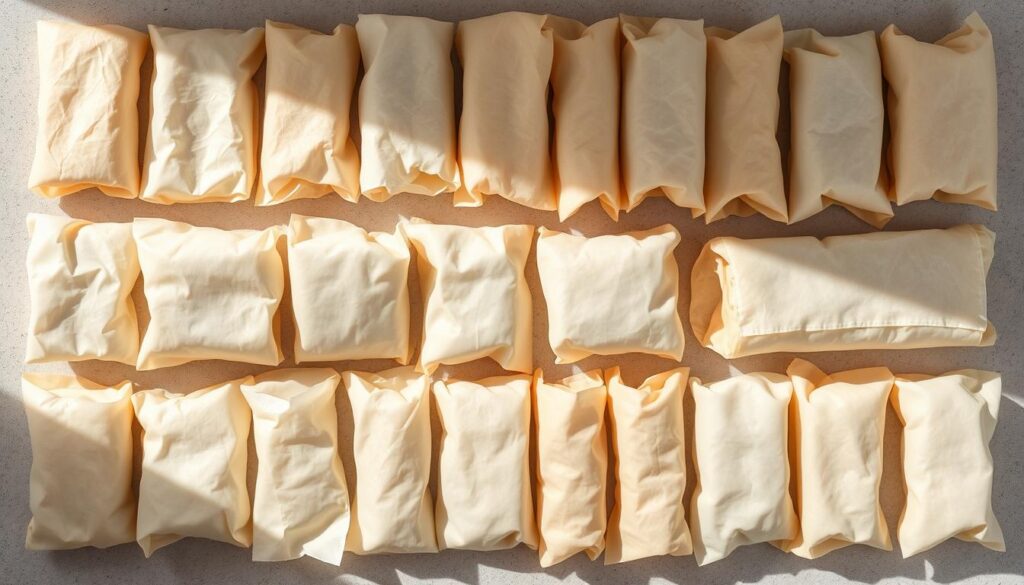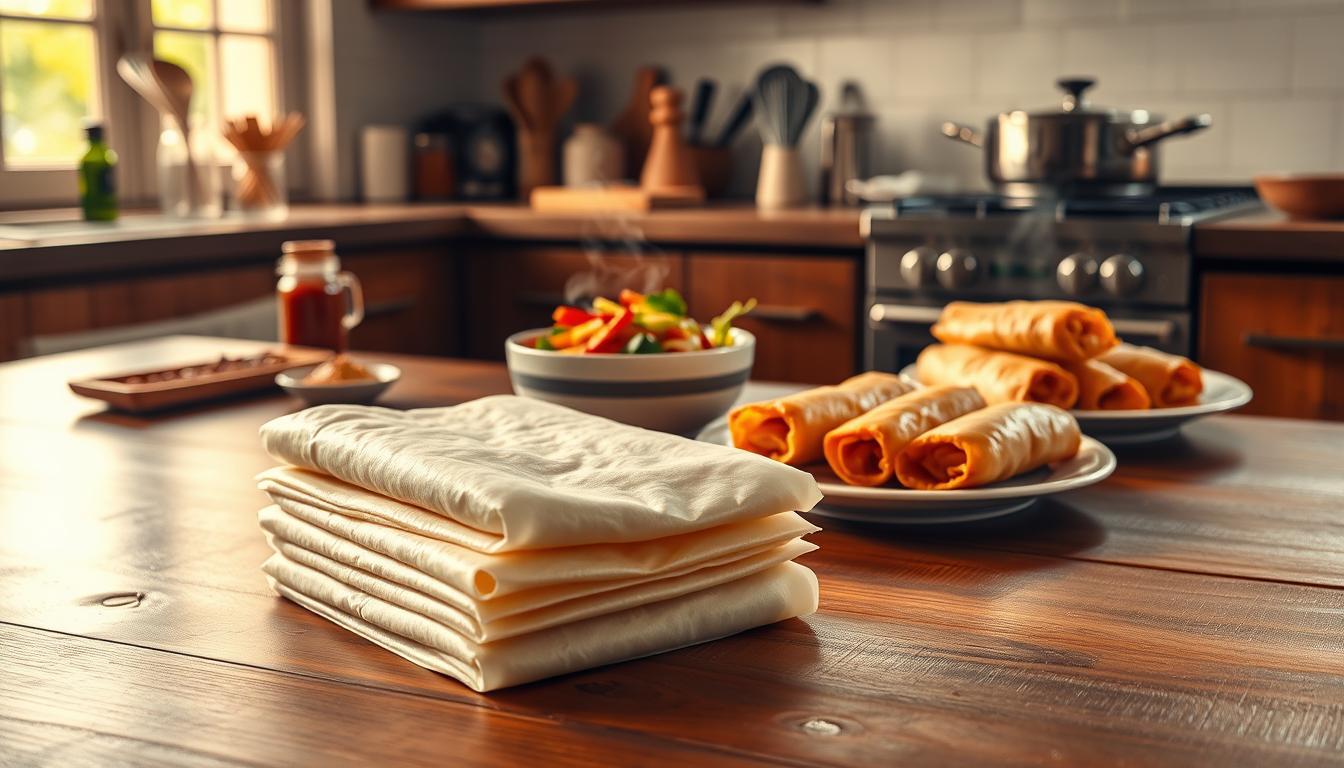Growing up, I watched my grandmother make amazing vegetable egg rolls. These crispy rolls brought our family together. They sparked my love for cooking and making delicious veggie spring rolls.
Vegetable egg rolls are more than a tasty snack. They’re a fun cooking adventure for anyone. This guide will help you make egg rolls that taste just like your favorite restaurant’s.
Making authentic vegetable egg rolls is more than just a recipe. It’s about learning new techniques and choosing the best ingredients. By the end, you’ll be able to make egg rolls that impress everyone.
Get ready for a tasty journey into making homemade vegetable egg rolls. Your kitchen will become a place of creativity. And these veggie spring rolls will be your masterpiece.
Table of Contents
Understanding the Difference Between Egg Rolls and Spring Rolls
Explore the world of Asian appetizers and learn about egg rolls and spring rolls. These snacks have unique qualities that make them special in Asian cooking.
Asian food is full of tasty delights, with egg roll wraps being just one. Let’s look at what makes each type unique.
Cultural Origins and Roots
Spring rolls come from East and Southeast Asia, with a long history in cooking. They have many styles:
- Fresh, translucent Vietnamese-style rolls
- Crispy Chinese variations
- Delicate Thai interpretations
Key Characteristics
Egg rolls and spring rolls differ in how they’re made and what’s inside:
| Feature | Spring Rolls | Egg Rolls |
|---|---|---|
| Wrapper | Thin, delicate rice paper | Thick, wheat-based wrapper |
| Cooking Method | Often served fresh | Typically deep-fried |
| Origin | Traditional Asian cuisines | American-Chinese adaptation |
Traditional Variations
Every region has its own take on these snacks. Vietnam has fresh rolls, China has crispy ones, and Thailand makes them light and delicate.
“The beauty of Asian cuisine lies in its incredible diversity and regional creativity.” – Chef Martin Yan
Knowing these differences helps you enjoy making authentic egg roll wraps. It also lets you explore the rich world of Asian appetizers.
Essential Equipment and Ingredients for Vegetable Egg Rolls
To make tasty meatless crispy rolls, you need the right tools and ingredients. Your plant-based appetizer rolls will be amazing with the right preparation and ingredients.
First, gather the necessary tools for making perfect vegetable egg rolls:
- Large cutting board
- Sharp chef’s knife
- Mixing bowls
- Measuring cups and spoons
- Wok or deep frying pan
- Tongs or slotted spoon
- Paper towels for draining
Next, pick fresh and tasty ingredients for your plant-based appetizer rolls:
- Wrappers: Rice paper or wheat flour wrappers
- Vegetables: Cabbage, carrots, bean sprouts, mushrooms
- Proteins: Tofu, tempeh, or textured vegetable protein
- Aromatics: Garlic, ginger, green onions
- Seasonings: Soy sauce, sesame oil, rice vinegar
Choosing the right ingredients is key for great flavor and texture in your meatless crispy rolls. Pick fresh, crisp veggies and the right wrappers for that perfect crunch.
Pro tip: Prep all ingredients before you start rolling to make the process smooth and enjoyable!
With your equipment and ingredients ready, you’re all set to make delicious vegetable egg rolls. They’ll surely impress your family and friends.
Selecting and Preparing Fresh Vegetables
Making tasty vegan egg roll bites begins with picking the right veggies. The secret to great egg roll bundles is using fresh, crisp ingredients. These should be full of flavor and good for you.
Top Vegetable Choices for Egg Roll Filling
Choosing the right veggies is key to your egg rolls’ success. The best ones offer a mix of texture and taste:
- Cabbage (green or purple) – provides crunch and volume
- Carrots – adds sweetness and vibrant color
- Bean sprouts – brings light, crispy texture
- Mushrooms – creates depth of flavor
- Green onions – adds a subtle bite
Precision in Vegetable Preparation
How you cut your veggies is important for perfect egg roll bites. You want thin, even slices. This ensures they cook right and roll smoothly.
Managing Vegetable Moisture
Too much moisture can make your egg rolls soggy. Here’s a trick: after chopping, let the veggies sit on paper towels. This helps soak up extra liquid. Your egg rolls will be crispy and delicious every time.
“The secret to great egg rolls is in the preparation of your vegetables” – Professional Chef
Vegetable Nutrient Breakdown
| Vegetable | Calories | Key Nutrients |
|---|---|---|
| Cabbage | 22 | Vitamin K, Vitamin C |
| Carrots | 41 | Beta-carotene, Fiber |
| Bean Sprouts | 31 | Protein, Vitamin C |
Choosing the Right Wrapper Type

Choosing the right wrapper is key to making tasty veggie wraps. The wrapper you pick can greatly affect the texture and taste of your egg rolls. Knowing your options helps you make the best homemade egg rolls.
There are two main types of wrappers for vegetable egg rolls:
- Rice Paper Wrappers: These are thin and delicate, making your wraps light and fragile
- Wheat Flour Wrappers: Thicker and opaque, they give your wraps a sturdy base
Think about these things when picking a wrapper:
- How crispy you want your wraps
- If you have dietary restrictions
- How you plan to cook them
- Your favorite texture
Rice paper is great for fresh, unfried wraps. Wheat flour is better for deep-fried or air-fried ones. There are gluten-free options for those with special diets, so everyone can enjoy these tasty snacks.
Pro tip: Always keep your wrappers covered with a damp towel to prevent drying out during preparation.
Try out different wrappers to find your favorite way to make vegetable roll-ups. The right wrapper can turn a simple recipe into a masterpiece.
Mastering the Perfect Filling Mixture
Making a great filling is key to tasty vegetable egg rolls. Your veggie spring rolls will shine with the right mix of ingredients. It’s all about finding a balance that pleases your taste buds and leaves a lasting impression.
Seasoning and Spice Combinations
Boost your vegetable egg rolls with a special seasoning mix. Here are some tips:
- Garlic and ginger for depth
- Soy sauce for umami
- White pepper for subtle heat
- Sesame oil for nutty undertones
Texture Balance Tips
Getting the right texture in your veggie spring rolls is important. Mix crunchy and soft ingredients:
- Crunchy vegetables like cabbage and carrots
- Soft elements such as bean sprouts
- Finely chopped herbs for freshness
Proportions Guide
It’s vital to have the right amounts for your vegetable egg rolls. Here’s a suggested ratio:
- 60% chopped vegetables
- 20% protein (optional tofu or mushrooms)
- 10% herbs and seasonings
- 10% binding ingredients
Pro tip: Always drain excess moisture from vegetables to prevent soggy egg rolls!
Step-by-Step Rolling Technique
Learning to roll vegetarian egg roll wraps is key to making tasty and healthy snacks. The way you roll them affects their texture, look, and quality.
- Lay the vegetarian egg roll wrap flat on a clean surface
- Position the filling diagonally across the wrapper’s center
- Fold the bottom corner tightly over the filling
- Fold in the side edges to create a sealed pocket
- Roll the wrapper upward, pressing edges to seal
For tight, secure rolls, remember these tips:
- Use minimal filling to prevent overstuffing
- Keep edges slightly damp with water for better sealing
- Roll firmly but gently to maintain wrapper integrity
| Rolling Technique | Best Practices |
|---|---|
| Wrapper Placement | Diamond shape facing you |
| Filling Amount | 2-3 tablespoons maximum |
| Sealing Method | Water or egg wash |
Practice is essential for making these healthy egg roll snacks. With time, you’ll get better at rolling. Soon, you’ll make crispy, delicious vegetarian egg roll wraps every time.
Cooking Methods for Crispy Results
To make perfect meatless crispy rolls, you need to know how to cook them. The cooking method you choose can change how they taste and feel. Let’s look at three main ways to get that crunchy texture.
Deep Frying for Ultimate Crispiness
Deep frying is the best way to make traditional crispy egg rolls. It makes them golden brown and crunchy. Here’s how to do it right:
- Heat oil to 375°F (190°C)
- Fry rolls in small batches
- Cook for 2-3 minutes until golden brown
- Drain on paper towels to remove excess oil
Air Fryer: A Healthier Alternative
If you want a lighter version of crispy rolls, try the air fryer. It uses little oil but still makes them crispy.
| Cooking Method | Temperature | Cooking Time |
|---|---|---|
| Air Fryer | 400°F (204°C) | 8-10 minutes |
| Turning Frequency | Halfway through | Ensure even cooking |
Baking: Oil-Free Cooking Option
Baking is a low-oil way to make plant-based appetizer rolls. It’s not as crispy as frying but is healthier and still tasty.
- Preheat oven to 425°F (218°C)
- Place rolls on a lined baking sheet
- Lightly brush with olive oil for extra crispiness
- Bake for 15-20 minutes, turning once
Pro tip: Let your rolls rest for a few minutes after cooking. This helps keep them crispy.
Essential Dipping Sauces and Accompaniments
Make your vegan egg roll bites even better with tasty dipping sauces. These sauces turn simple snacks into unforgettable meals. The right sauce can make your homemade vegetable egg rolls stand out.
Classic Dipping Sauce Favorites
- Sweet and Sour Sauce: A tangy classic that complements vegan egg roll bites perfectly
- Peanut Sauce: Creamy and rich, offering a nutty depth to your nutritious egg roll bundles
- Sweet Chili Sauce: Provides a spicy-sweet kick that awakens taste buds
Homemade Sauce Recipes
Make your own dipping sauces to control what goes in them. Fresh ingredients make all the difference in enhancing your vegetable egg rolls.
| Sauce Type | Key Ingredients | Flavor Profile |
|---|---|---|
| Sweet and Sour | Rice vinegar, sugar, ketchup | Tangy and bright |
| Peanut Sauce | Peanut butter, soy sauce, ginger | Creamy and rich |
| Plum Sauce | Plums, vinegar, garlic | Sweet and slightly tart |
Try out these sauces to find your favorite for vegan egg roll bites. Each sauce adds a special touch to your egg roll bundles, making every bite a new adventure.
Pro tip: Always serve sauces at room temperature to maximize flavor complexity.
Storage and Make-Ahead Tips
Preparing vegetable roll-ups ahead of time saves you time. It also makes sure you have a tasty snack ready. Keeping them stored properly is crucial for their quality and taste.
Refrigeration Techniques
Here are key tips for storing uncooked vegetable egg rolls:
- Wrap each roll in plastic wrap
- Put them in an airtight container
- Keep them in the fridge for 2-3 days
Freezing Your Vegetable Roll-Ups
Freezing is great for longer storage of your veggie wraps:
- Use parchment paper to separate rolls
- Store in a freezer-safe container
- Freeze for up to 3 months
| Storage Method | Duration | Best For |
|---|---|---|
| Refrigeration | 2-3 days | Short-term storage |
| Freezing | Up to 3 months | Long-term preservation |
Reheating Tips
To keep your vegetable roll-ups crispy, try these reheating methods:
- Oven: Preheat to 375°F, bake for 10-12 minutes
- Air Fryer: Cook at 350°F for 3-4 minutes
- Avoid Microwave: It can make the wrapper soggy
Pro tip: Always thaw frozen vegetable roll-ups in the fridge before reheating. This keeps their texture and flavor.
By using these storage and preparation tips, you’ll always have fresh, tasty veggie wraps ready.
Common Mistakes to Avoid When Making Vegetable Egg Rolls
Making perfect vegetable egg rolls takes skill and practice. Even experienced cooks can face challenges. Knowing common mistakes helps you make crispy, tasty veggie spring rolls every time.
Mastering vegetable egg rolls means avoiding common cooking obstacles. Let’s look at the most frequent mistakes and how to avoid them:
Wrapper Handling Challenges
- Keep wrappers covered with a damp towel to prevent drying
- Work with one wrapper at a time to maintain flexibility
- Use cornstarch slurry for secure sealing instead of egg wash
Filling Preparation Pitfalls
Creating the perfect filling for vegetable egg rolls needs careful attention:
- Avoid overstuffing wrappers, which causes tearing
- Drain excess moisture from vegetables before mixing
- Chop vegetables into uniform, small pieces for even cooking
Cooking Technique Errors
| Mistake | Solution |
|---|---|
| Incorrect oil temperature | Use a thermometer to maintain 350-375°F |
| Overcrowding pan | Fry in small batches for crispy results |
| Uneven cooking | Rotate egg rolls during frying |
Pro tip: Practice makes perfect when preparing vegetable egg rolls. Don’t get discouraged if your first attempts aren’t flawless. Each batch will improve your technique!
The key to great veggie spring rolls is patience and attention to detail.
Conclusion
Making delicious vegetarian egg roll wraps is a fun journey. You’ve learned how to make healthy snacks that wow everyone. It’s all about picking the right ingredients, mastering the roll, and trying new flavors.
You can now try different veggies and cooking ways. You might deep-fry for crunch or air fry for a lighter taste. Every batch is a chance to get better and show off your style.
Don’t worry if it takes time to get it right. Start with simple wraps and add new things as you go. Your kitchen is a place to play and try new things.
Keep practicing and you’ll make snacks that are not just tasty but also show off your skills. Enjoy the journey, savor each bite, and keep exploring the world of homemade egg rolls.
FAQ
What’s the difference between egg rolls and spring rolls?
Egg rolls have a thicker, wheat-based wrapper and are deep-fried. This makes them crunchier. Spring rolls have a thinner wrapper and can be fresh or fried. They are lighter and more delicate than egg rolls.
Can I make vegetable egg rolls gluten-free?
Yes, you can use gluten-free wrappers. Look for them in Asian grocery stores or specialty sections. Make sure to check the ingredients to meet your dietary needs.
How do I prevent my egg rolls from becoming soggy?
Drain and pat dry your vegetables well. Use a clean towel or paper towels to remove moisture. Don’t overload the filling and cook immediately. Keep the oil temperature right when frying.
Can I prepare vegetable egg rolls in advance?
Absolutely! You can make uncooked egg rolls and store them in the fridge for 1-2 days or freeze for a month. Use parchment paper between layers and store in an airtight container. Fry them from frozen, adjusting cooking time as needed.
What are the best vegetables for egg roll filling?
Great choices include cabbage, carrots, bean sprouts, mushrooms, and green onions. These offer a good mix of textures and flavors. Chop finely and avoid watery veggies. Adding water chestnuts or bell peppers can enhance flavor and color.
What cooking methods work best for vegetable egg rolls?
You can deep fry, air fry, or bake them. Deep frying gives a traditional crunch. Air frying and baking are healthier options that still yield a crispy exterior.
How do I seal egg roll wrappers properly?
Use water or beaten egg to seal the edges. Place filling diagonally, fold the bottom up, then the sides, and roll tightly. Make sure edges are sealed to prevent filling leaks.
Are vegetable egg rolls nutritious?
Yes, they can be nutritious with fresh veggies and baked or air-fried. They offer vitamins and minerals. Use whole grain wrappers, include colorful veggies, and avoid deep-frying to reduce oil.

